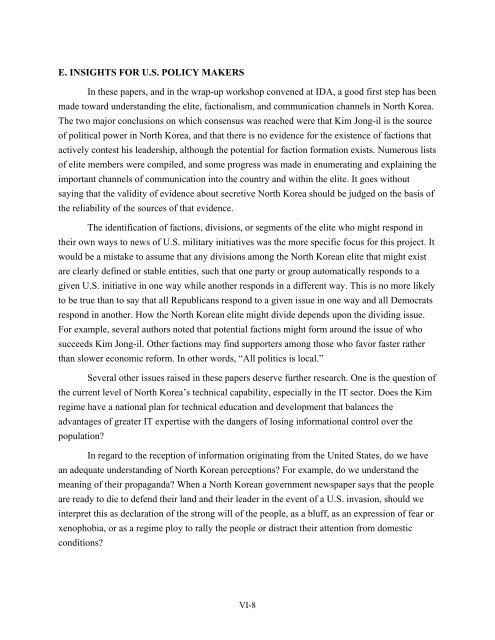North Korean Policy Elites - Defense Technical Information Center
North Korean Policy Elites - Defense Technical Information Center
North Korean Policy Elites - Defense Technical Information Center
You also want an ePaper? Increase the reach of your titles
YUMPU automatically turns print PDFs into web optimized ePapers that Google loves.
E. INSIGHTS FOR U.S. POLICY MAKERS<br />
In these papers, and in the wrap-up workshop convened at IDA, a good first step has been<br />
made toward understanding the elite, factionalism, and communication channels in <strong>North</strong> Korea.<br />
The two major conclusions on which consensus was reached were that Kim Jong-il is the source<br />
of political power in <strong>North</strong> Korea, and that there is no evidence for the existence of factions that<br />
actively contest his leadership, although the potential for faction formation exists. Numerous lists<br />
of elite members were compiled, and some progress was made in enumerating and explaining the<br />
important channels of communication into the country and within the elite. It goes without<br />
saying that the validity of evidence about secretive <strong>North</strong> Korea should be judged on the basis of<br />
the reliability of the sources of that evidence.<br />
The identification of factions, divisions, or segments of the elite who might respond in<br />
their own ways to news of U.S. military initiatives was the more specific focus for this project. It<br />
would be a mistake to assume that any divisions among the <strong>North</strong> <strong>Korean</strong> elite that might exist<br />
are clearly defined or stable entities, such that one party or group automatically responds to a<br />
given U.S. initiative in one way while another responds in a different way. This is no more likely<br />
to be true than to say that all Republicans respond to a given issue in one way and all Democrats<br />
respond in another. How the <strong>North</strong> <strong>Korean</strong> elite might divide depends upon the dividing issue.<br />
For example, several authors noted that potential factions might form around the issue of who<br />
succeeds Kim Jong-il. Other factions may find supporters among those who favor faster rather<br />
than slower economic reform. In other words, “All politics is local.”<br />
Several other issues raised in these papers deserve further research. One is the question of<br />
the current level of <strong>North</strong> Korea’s technical capability, especially in the IT sector. Does the Kim<br />
regime have a national plan for technical education and development that balances the<br />
advantages of greater IT expertise with the dangers of losing informational control over the<br />
population?<br />
In regard to the reception of information originating from the United States, do we have<br />
an adequate understanding of <strong>North</strong> <strong>Korean</strong> perceptions? For example, do we understand the<br />
meaning of their propaganda? When a <strong>North</strong> <strong>Korean</strong> government newspaper says that the people<br />
are ready to die to defend their land and their leader in the event of a U.S. invasion, should we<br />
interpret this as declaration of the strong will of the people, as a bluff, as an expression of fear or<br />
xenophobia, or as a regime ploy to rally the people or distract their attention from domestic<br />
conditions?<br />
VI-8













